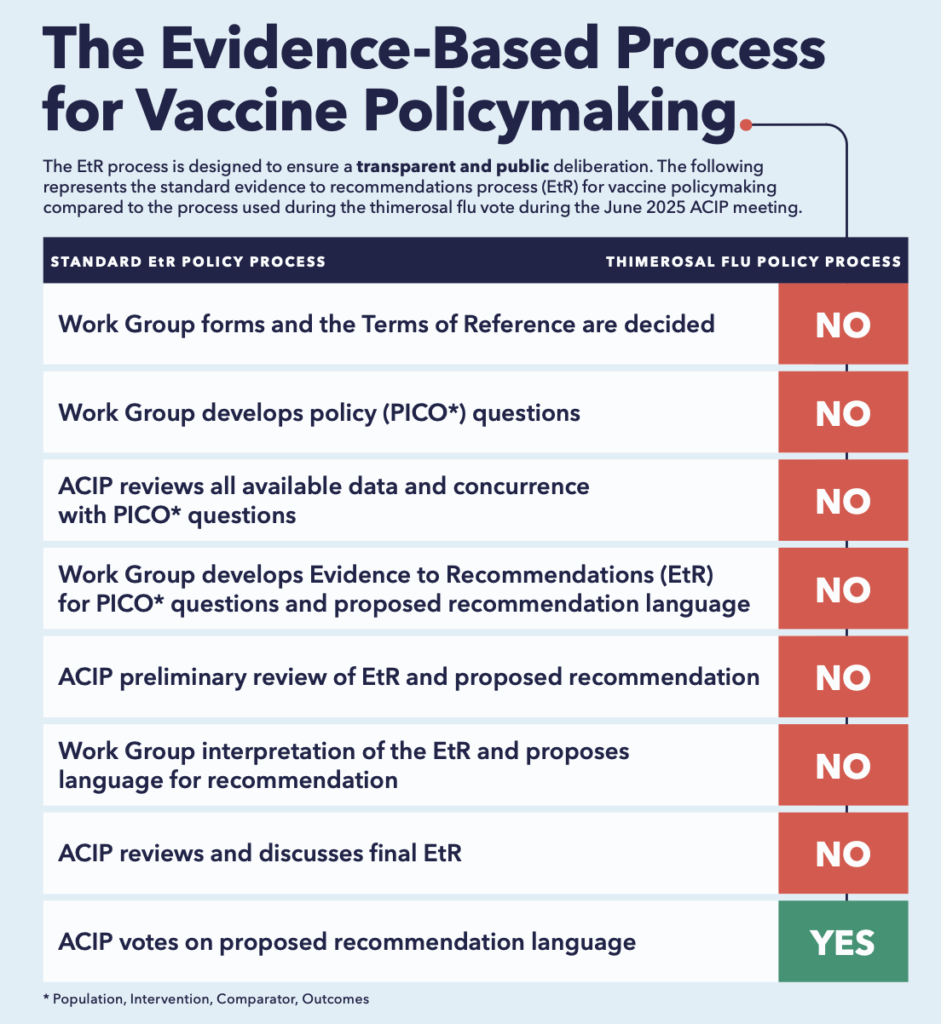VYF’s Public Comment on ACIP – September 2025
Vaccinate Your Family submitted the following public comment to the Federal Register ahead of the September meeting of the Advisory Committee on Immunization Practices (ACIP). It serves as an affirmation of why our organization remains committed to our mission of saving lives from vaccine-preventable diseases and outlines our concerns regarding the current ACIP.
_____
Vaccinate Your Family is a nonpartisan organization whose mission is to protect people of all ages from vaccine-preventable diseases. For more than thirty years, our organization and partners have relied on the Advisory Committee on Immunization Practices (ACIP) to help us achieve our mission by developing evidence-based immunization recommendations that guide healthcare providers and communities to protect our nation’s health. We agree with the ACIP statement following the June 26 meeting that recommendations should be “predicated on evidence-based medicine, including rigorous evaluation and expansive, credible scientific data, for both safety and efficacy.” However, following the recent changes in membership, work group participation, and updated ACIP COVID-19 Work Group charter, Vaccinate Your Family has serious concerns about the work of the ACIP as it stands today.
During the June meeting, we witnessed the low standard of evidence deemed acceptable by the committee. Specifically, ACIP members voted on a recommendation change about thimerosal-containing flu vaccines after hearing only one presentation (riddled with falsehoods) from an independent citizen, abandoning the scientific rigor the public has relied upon to keep our country safe from deadly infectious diseases.
This is a glaring departure from the standards we expect from the experts at ACIP. Since 2010, the ACIP has used the Grading of Recommendations Assessment, Development and Evaluation (GRADE) approach to support the development of evidence-based immunization schedule recommendations. After extensive consultation and public input, the ACIP adopted the Evidence to Recommendation (EtR) Framework in 2018. The EtR incorporates the GRADE framework for evaluating the quality of evidence and considers additional factors (e.g., implementation, cost-effectiveness, acceptability) in the development of vaccine recommendations.
Together, these frameworks support a transparent and consistent process for developing the ACIP recommendations that inform our nation’s immunization schedule. Prior to June 2025 ACIP members, as well as external experts, used this process to evaluate evidence (e.g., clinical trial data, cost-effectiveness models, vaccine safety system reports, real-world evidence) to determine the best recommendation.
The use of these frameworks takes time and labor–working groups usually meet for months to years to gather and present evidence for consideration at multiple ACIP meetings prior to advancing a recommendation to vote by the Committee.
Concerningly, the newly-reconstituted ACIP:
- Removed liaison members from working groups. Liaison members include infectious disease experts, nurses, pediatricians, geriatric specialists and more, thus diminishing transparency in the data review process.
- Did not publish an advanced agenda for the September 2025 meeting, further reducing transparency.
- Did not establish working groups for hepatitis or MMRV vaccines, which are on the agenda for discussion at this meeting.
This is especially concerning as some ACIP members themselves have publicly questioned the value, benefit, and safety of vaccines. At the September ACIP meeting, we anticipate discussion of COVID-19 vaccines, hepatitis B vaccines, MMRV vaccines, and RSV vaccines, as well as coverage through the Vaccines for Children (VFC) program. We fear that decisions of the Committee may seriously limit vaccine access without scientific basis and therefore may not be treated as trustworthy recommendations due to the lack of transparency and gold-standard science.
The changes to the ACIP process and membership are occurring as a part of the administration’s implementation of the “Make America Healthy Again” agenda. We too support a healthier America, but taking away access to vaccines will not help our nation achieve these goals. Especially when the vaccines on the agenda for this meeting currently support our health, reduce risk of chronic disease, and save lives from these diseases.
- COVID-19: Over 1.2 million Americans have died of COVID-19, and COVID-19 infection can lead to long COVID or increase an individual’s risk of heart failure or heart attack.
- Hepatitis B: Approximately 90% of infants infected with hepatitis B will remain chronically infected with the virus, and chronic infection with hepatitis B can lead to liver cancer–a cancer that remains in the top ten leading causes of cancer deaths in the U.S. Our nation does not have a system to ensure that all pregnant women are tested for hepatitis B.
- MMRV: This vaccine prevents four dangerous diseases that often infect children. By preventing these diseases, the vaccine saves lives and prevents long-term immune system suppression, hearing loss, arthritis, chronic pain, and other serious chronic conditions. Instead of requiring two injections (MMR and Varicella) it is given as a single injection.
- Pediatric RSV: Severe RSV in infants can cause long-term respiratory problems like asthma, and an estimated 58,000-80,000 children under 5 years old are hospitalized annually due to RSV.
Recent polls and surveys indicate that the vast majority of American families support vaccines. The President of the United States supports vaccines. The ACIP, CDC, and HHS owe it to the American people to make transparent and evidence-based recommendations based on gold standard science. We are parents, caregivers, and public health advocates who will not stand by as ACIP continues to limit access to vaccines. Vaccines must continue to be available, accessible, and affordable. American families deserve to have the choice to vaccinate, and American lives depend on it.
